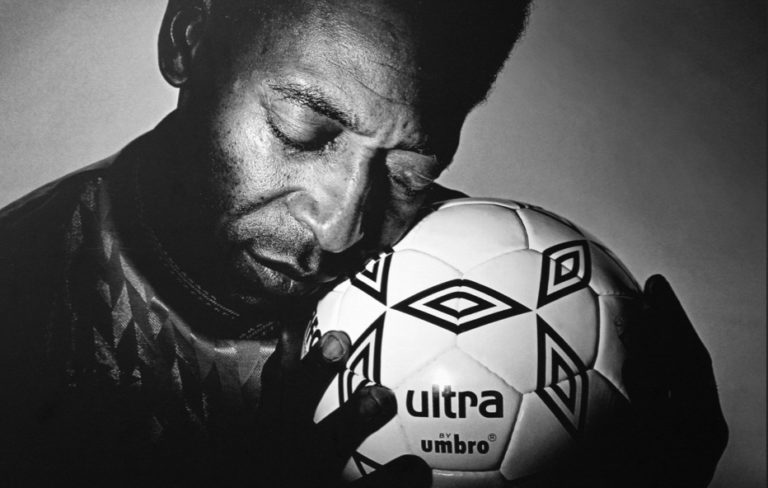
Three-time World Cup Brazilian soccer player Pelé died today at the age of 82. The athlete, who became the sport’s first global icon, died at Albert Einstein Hospital in São Paulo from multiple organ failure due to the progression of colon cancer, CNN is reporting.
Pelé was admitted to the hospital late last month for a respiratory infection and complications related to the cancer. Last week, his health had worsened as his cancer progressed. according to a statement from the hospital.
For more than 60 years, Pelé has been synonymous with soccer. He played in four World Cups and is the only player in history to win three. He’s also remembered for his remarkable goal-scoring record.
“I was born to play [soccer], just like Beethoven was born to write music and Michelangelo was born to paint,” Pelé famously said.
Tributes have been pouring in on social media for the soccer legend since the reports of his death was announced. Pelé’s first club, Santos FC, responded to the news on Twitter with the word “eternal” shared next to an image of a crown.
Fellow Brazilian soccer player Neymar said Pelé “changed everything.” In a post on Instagram, he wrote: “He turned [soccer] into art, into entertainment. He gave a voice to the poor, to black people and especially: He gave visibility to Brazil. Football and Brazil have raised their status thanks to the King!”
Portuguese star forward Cristiano Ronaldo sent his condolences to Pelé’s home country in a post on Instagram. He said: “a mere goodbye to the eternal King Pelé will never be enough to express the pain that currently engulfs the entire football world.”
Former English soccer player Geoff Hurst tweeted about his memories of Pelé, calling the late star “without doubt the best footballer I ever played against…For me Pele remains the greatest of all time and I was proud to be on the the pitch with him. RIP Pele and thank you.”
Brazil’s incoming President Luiz Inácio Lula da Silva also paid his respects to Pelé on Twitter, saying “few Brazilians took the name of our country as far as he did.”
A public wake will be held for Pelé on Monday in São Paulo. The wake will take place at the Urbano Caldeira stadium, which is popularly known as Vila Belmiro and is the home to the Santos football club, according to a statement Santos FC made today.
At dawn on Monday, the athlete’s body will be moved from the Albert Einstein Hospital to the stadium. Once it arrives at the stadium, his coffin will be placed in the center of the pitch.
The wake at Vila Belmiro will continue until Tuesday 10 a.
m. local time (8 a.m. ET). After the wake, a funeral procession will carry Pelé’s coffin through the streets of the city of Santos, including the street where Pelé’s 100-year-old mother, Celeste Arantes, lives.
The procession will continue to the soccer player’s final resting place, the Memorial Necrópole Ecumênica cemetery in Santos. A private funeral, which is reserved for his family members, will then be held there.
Pelé was born Edson Arantes do Nascimento in Três Corações, a city approximately 155 miles northwest of Rio de Janeiro, in 1940. His family later moved to the city of Bauru in São Paulo.
As a child, Pelé’s initial exposure to playing soccer involved playing barefoot with socks and rags rolled up into a ball.
The athlete was in part inspired to become involved in the game because “My dad was a good football player, he scored a lot of goals,” he told CNN in 2015. “His name was Dondinho; I wanted to be like him…He was my role model. I always wanted to be like him.”
The soccer player was nicknamed Pelé at a young age, he told The Guardian in 2006, after he mispronounced Bilé, the nickname of a goalie on his father’s team.
As a teenager, Pelé left home and began training with Santos. He scored his first goal for the club before his 16th birthday. He would go on to score 619 times over 638 appearances for the club.
Pelé was first introduced to the world in 1958, when he made his World Cup debut at age 17. He scored Brazil’s only goal in the country’s quarterfinal victory against Wales, then netted a hat-trick in the semifinal against France and two in the final against host Sweden.
For Pelé, the standout memory from the tournament was putting his country on the sporting map. “When we won the World Cup, everybody knew about Brazil,” he told CNN’s Don Riddell in 2016. “I think this was the most important thing I gave to my country because we were well known after that World Cup.”
Another World Cup victory came in 1962, although an injury sidelined Pelé for the tournament’s later stages, as well as in 1970.
The athlete retired from soccer on October 1, 1977, nearly two years after he joined the New York Cosmos of the North American Soccer League. His final game, which was played in front of a record 77,000 soccer fans in New Jersey, was particularly special for him because it was between the Cosmos and Santos.
Pelé is survived by six of his seven children and his wife, businesswoman Marcia Cibele Aoki.


Brazilians bid a final farewell this week to football giant Pele, starting Monday with a 24-hour public wake at the stadium of his long-time team, Santos.
https://www.sabcsport.com/football/news/final-farewell-for-pele-brazils-football-king